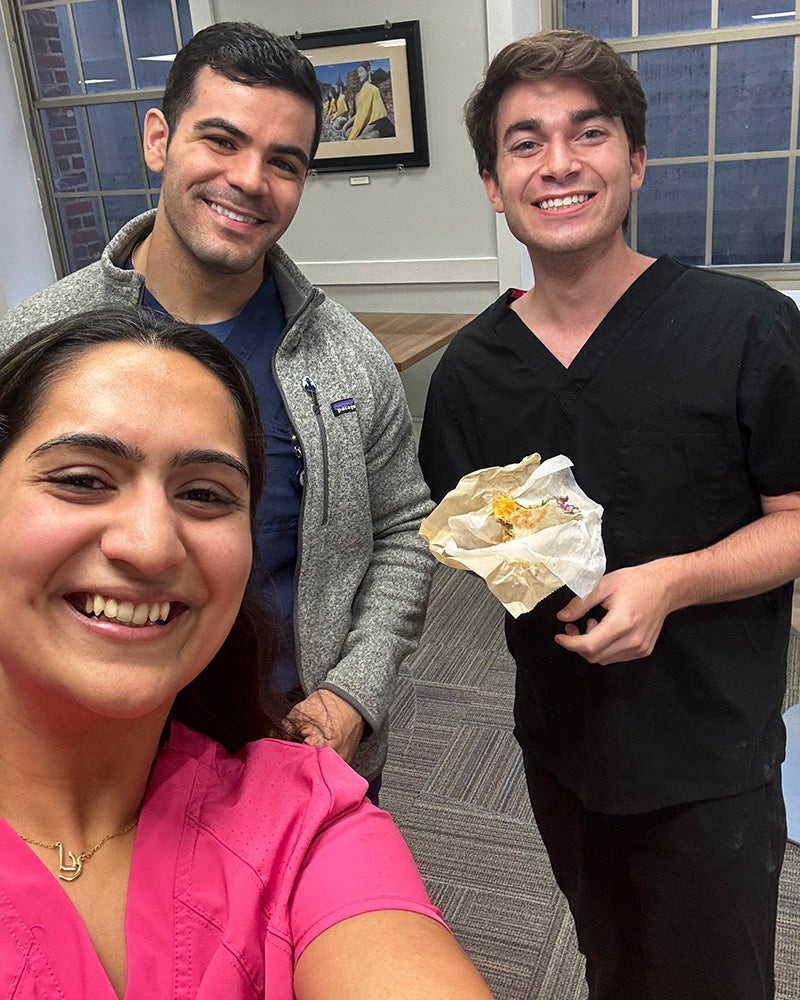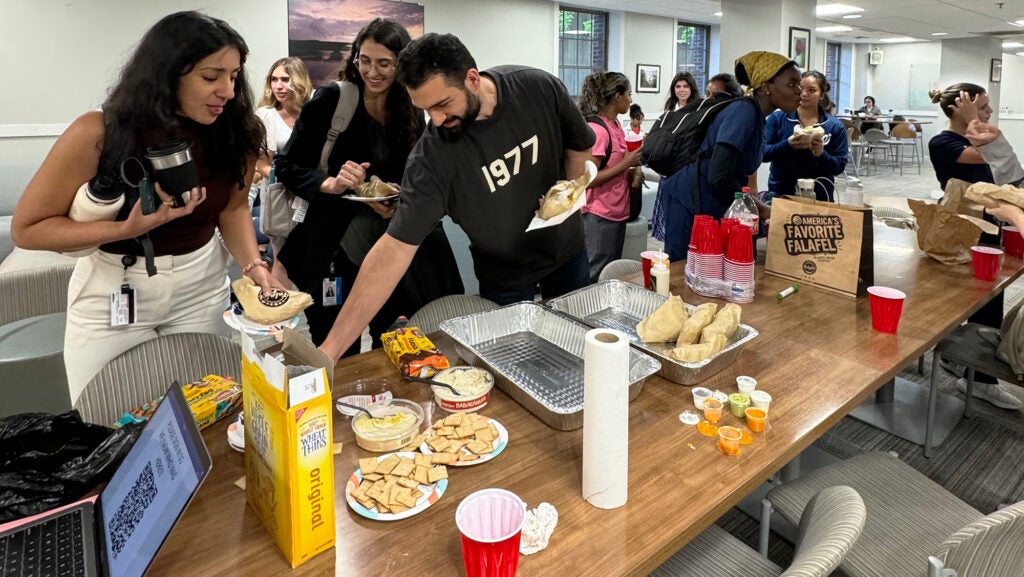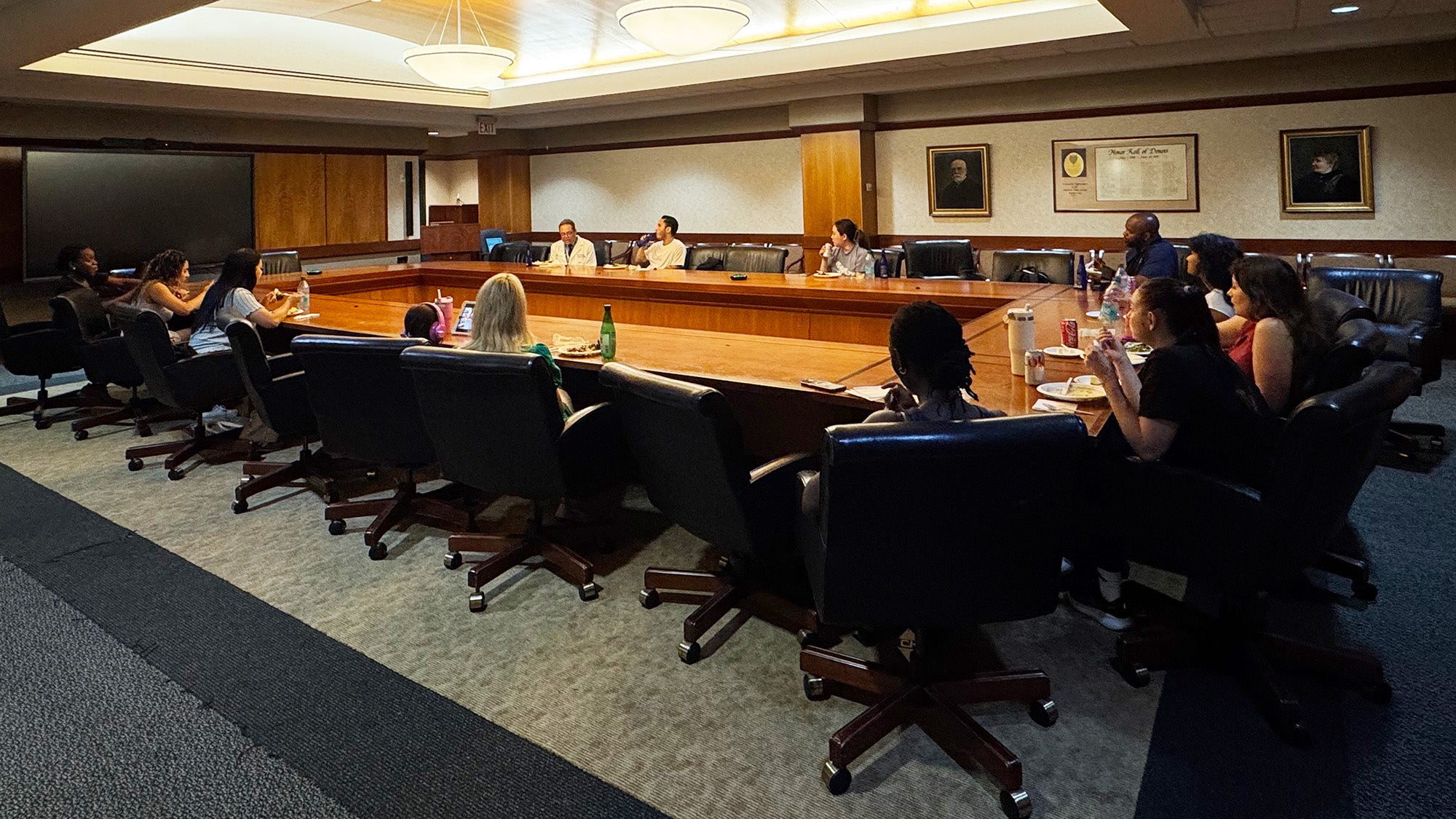First-Generation Medical Students Build Community Through Supportive, Honest Conversations
(September 5, 2025) — Navigating the medical school journey can be especially challenging for students who are the first in their families to pursue medicine, a group comprising only 15% of students in U.S. medical schools. The First-Generation in Medicine Club at the School of Medicine is working to change the experience for first-generation Georgetown medical students.
The group organizes social and informational events to build community among these students. The newest of these is a fireside chat series designed to provide third-year students in the clinical phase of their education with the chance to tap the collective knowledge of first-generation physician leaders.

Reeda Iqbal (M’27), pictured front left, co-president of the First-Generation in Medicine Club, at a recent club event.
“Many of us experience imposter syndrome and challenges in navigating the hidden curriculum without mentorship, so these fireside conversations aim to provide guidance, support and a greater sense of belonging in medicine,” said Reeda Iqbal (M’27), co-president of the First-Generation in Medicine Club. “These sessions aim to create a safe and empowering space for open conversation, guidance, and community-building,” she added.
Approximately 15 medical students attended the series’ first event, held in June, which featured two first-generation physician leaders, Joelle Borhart, MD, emergency medicine program director, and Carlo Tornatore, MD, professor and chair of the Department of Neurology at the School of Medicine.
Iqbal described the fireside chats as networking and information-gathering events where medical students could ask questions of attendings and residents on a range of topics that could be uncomfortable to ask in a more formal classroom setting, such as, “Should I purchase scrubs for rotations?” or “How many questions should I ask to seem engaged and professional on a topic but not overstep?”
“It’s also so validating to hear residents and attendings answer these questions and share their experiences,” said Iqbal. “We hope to connect with more first-generation residents, young attendings and faculty members to have them share their experiences with us.”
A Safe Space for Honest Conversations
The fireside chats are geared toward medical students who have reached the clinical phase in their studies. Second year medical students organize social events and physician mentorships for preclinical students.
“We always kick off the start of the academic year with a social event to encourage building community and let other first-generation in medicine students know they are not alone,” said Aliza Haider (M’28), one of the preclinical co-presidents of the group. Before students start their M1 year, the first-generation in medicine group also organizes an annual “What We Wish We Knew Before Medical School” event, where older first-generation students share advice and tidbits about their experiences.
“We create safe spaces for students who identify as the first in their family to join the field of medicine, which has a lot of overlap with students who also come from low-income backgrounds,” said Haider. “Many of us don’t come into medical school with built-in support networks, so we take it upon ourselves to share resources and what we have learned so that we can increase opportunities for all of us.”
As part of the physician mentorship program for M1s and M2s, the First-Generation in Medicine Club organizes panels with upperclassmen about how to rank and succeed at rotations, while also learning more about different specialties.
“At one recent event, we had an attending in neurosurgery who shared with us the doubts they had about choosing the specialty because of the long residency program and the financial costs it takes to pursue that as someone from a low-income background,” said Bouchra Benghomari (M’29), the club’s other preclinical co-president.

Club events encourage community-building and let other first-generation medical students know they are not alone.
The Association of American Medical Colleges found the majority of first-generation students grew up with a family income below $50,000 per year, and several students expressed making professional decisions based on financial considerations.
“It’s hard not to think of longer training as a delay in income, especially when several of us are supporting not just ourselves but also our families” said Benghomari, who had initially wanted to pursue the MD/PhD program at Georgetown but felt she couldn’t commit to the eight years it takes on average to complete the program.
“The pressure not to fail is already intense, but when you think about how your career is also your family’s retirement plan it can feel almost overwhelming. So being able to talk with other people going through something similar is self-care, and letting me know we can find paths for us,” said Benghomari.
As part of the fireside chat series, Iqbal also incorporates conversations about managing student loans, including recent proposed federal changes such as eliminating Grad PLUS loans and putting caps on borrowing.
“Changes to student loan borrowing will greatly impact first-generation students and make medical school, which is already very expensive, unobtainable,” said Iqbal.
“First-generation students are extremely resilient. We have overcome obstacles, often enduring multiple gap years and application cycles before enrolling, and that gives us the perspective that we are lucky to be able to practice medicine and stand in front of future patients as doctors,” said Benghomari. “Our backgrounds as low-income first-generation students are rare in medicine, and that makes us an asset to the field because we have a perspective that can help us connect with patients facing extreme disadvantages in underserved areas.”
The next event is scheduled for September and features three additional first-generation physicians leaders, Leah Orta-Nieves, MD; Shawn Tejiram, MD, program director, clinical burn surgery fellowship; and Kirstiaan L. Nevin, MD, director, MedStar Health Division of General Obstetrics and Gynecology. The series is supported by the School of Medicine’s Office of Diversity, Equity, and Inclusion and Belonging. First-generation physicians interested in connecting with the First-Generation in Medicine Club may do so by emailing gusomgeneration1@gmail.com.
Heather Wilpone-Welborn
GUMC Communications
